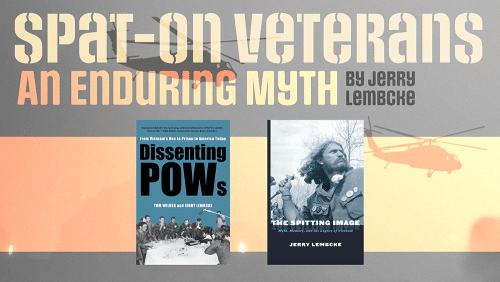In May, 2012, the Obama Administration announced a project to commemorate the U.S. war in Vietnam. The project, funded by Congress for $65 million and administered by the Department of Defense, extended across the years 2012 to 2025, comprising a set of 50th anniversary events. The President announced his project at the Veterans Memorial Wall in Washington, D.C., indicating that veterans themselves, not the war, would be the focus of the commemorations. Speaking to the cameras, the President called the Vietnam War “one of the nation’s most painful chapters.” He said the treatment of Vietnam veterans “…was a national shame, a disgrace that should have never happened” and promised that “we’re here today to see that it doesn’t happen again.”
News pundits were quick to associate the President’s remarks with the most enduring image of veteran mistreatment: that of the spat-upon veteran. The Los Angeles Times editorialized that it was a mythical image—an edifying myth, said editor Michael McGough, but still a myth.
Apparently, Wall Street Journal editors did not get the memo. Its January 30, 2023, pages carried Jerry Davis’s “Vietnam War Veterans Deserve an Apology.” In the article, Davis claims that “veterans were often advised not to wear their uniforms lest they become targets for mistreatment. Some were cursed, spat on, and worse.” He goes on to say that “Vietnam veterans often had trouble getting jobs.”
Little in what Davis says is true. To fly home free on a commercial airline, returnees from Vietnam had to be in uniform. Employers were required to hire-back men drafted for Vietnam upon their return. It is true that plant closings in the auto and steel industries in the late 1970s hit Vietnam veterans hard—but that is not what Davis is writing about.
There is no evidence that Vietnam veterans were spat on. Nor could they have been, at least not in the manner described in the most often told stories. Those stories tell of landing at San Francisco Airport and being met by groups of spitters, often hippies. But flights from Vietnam landed at military airbases like Travis outside San Francisco; protesters could not have gotten on the airbase, much less near deplaning troops.
The spitting stories are folklore. They didn’t emerge until 1990, when supporters of US efforts in the Persian Gulf wanted to discredit antiwar activists. These stories became props in the larger narrative that the war in Vietnam was lost on the Homefront. Liberals in Congress would not support the war that needed to be fought, and radicals in the streets and on college campuses demoralized our troops. Meanwhile, protesters gave aid and comfort to the communist enemies in North Vietnam. The spitting stories provide the grounding imagery for the great betrayal narrative, a nationalist myth that claims the Vietnam war was fought and lost at home.
A similar betrayal narrative fueled the remilitarization of Germany after World War I, which scapegoated women, communists, and Jews for its losses in that war. Those echoes can be heard in the responses to American militarism since Vietnam: President Ronald Reagan hoisted the POW/MIA flag, reminding us that we fight for those who got left behind; President George H.W. Bush’s statement that we “kicked the Vietnam Syndrome” in the Persian Gulf could be read as saying the war there was really about Vietnam; President Obama’s 2012 statement (above) speaks for itself; and Donald Trump’s campaign slogan “Make America Great Again” implies questions about how and when the country was knocked from its perch. The American great betrayal narrative provides some answers.
In his Wall Street Journal piece, Jerry Davis turns Vietnam veterans into victims of the war. Of course, some men returned with terrible life changing wounds, but Davis turns a whole generation of American veterans into victims. That is mythmaking. Let’s not forget that most victims of the war were Vietnamese, including hundreds of thousands of military personnel and civilians. Most American veterans went back to work or to school. Politicized and empowered by their experience in Vietnam, thousands of others joined the antiwar movement and helped end the war. It might be coincidence that the Wall Street Journal ran Davis’s piece just a day after the antiwar group Code Pink and the Massachusetts Peace Action network rallied in support of a negotiated settlement of the Russia-Ukraine conflict and against more arms for Ukraine. Coincidence or not, it would behoove Americans to bone up on the history of victim-veteran imagery being used to arouse the passions for war.
See the post on the NYU Press blog

Comments are closed.